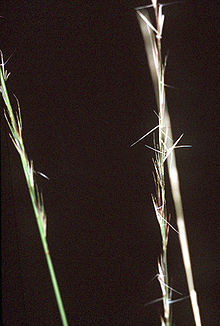Aristida
| Aristida | |
|---|---|

| |
| Purple three-awn, Aristida purpurea | |
| Scientific classification | |
| Kingdom: | Plantae |
| Clade: | Tracheophytes |
| Clade: | Angiosperms |
| Clade: | Monocots |
| Clade: | Commelinids |
| Order: | Poales |
| Family: | Poaceae |
| Subfamily: | Aristidoideae |
| Tribe: | Aristideae |
| Genus: | Aristida L. |
| Type species | |
| Aristida adscensionis | |
| Synonyms[3] | |
| |

Aristida is a very nearly cosmopolitan genus of plants in the grass family.[4][5] Aristida is distinguished by having three awns (bristles) on each lemma of each floret.[6] The genus includes about 300 species found worldwide, often in arid warm regions. This genus is among those colloquially called three-awns wiregrasses, speargrasses and needlegrasses.[7][8][9] The name Aristida is derived from the Latin "arista", meaning "awn".[10]
They are characteristic of semiarid grassland. The Wiregrass Region of North America is named for A. stricta. Other locales where this genus is an important component of the ecosystem include the Carolina Bays, the sandhills of the Carolinas, and elsewhere, Mulga scrub in Australia, and the xeric grasslands around Lake Turkana in Africa. Local increases in the abundance of wiregrasses is a good indicator of overgrazing, as livestock avoid them.
Description
Aristida stems are ascending to erect, with both basal and cauline leaves. The leaves may be flat or inrolled, and the basal leaves may be tufted. The inflorescences may be either panicle-like or raceme-like, with spiky branches. The glumes of a spikelet are narrow lanceolate, usually without any awns, while the lemmas are hard, three-veined, and have the three awns near the tip. The awns may be quite long; in A. purpurea var. longiseta they may be up to 10 cm.
Species
Selected species include:
- Aristida adscensionis L.
- Aristida anaclasta
- Aristida basiramea – fork-tipped three-awn, forked three-awn
- Aristida behriana F.Muell.
- Aristida beyrichiana
- Aristida burkei – bohlanya-ba-pere (Sesotho: "horse-madness grass")
- Aristida californica
- Aristida calycina R.Br.
- Aristida capillacea Lam.
- Aristida chaseae
- Aristida congesta
- Aristida contorta F.Muell.
- Aristida dichotoma Michx. – churchmouse threeawn, poverty grass
- Aristida divaricata
- Aristida granitica
- Aristida guayllabambensis
- Aristida junciformis
- Aristida longespica – slim-spiked three-awn
- Aristida oligantha Michx. – prairie three-awn
- Aristida portoricensis – pelos del diablo
- Aristida pungens – drinn
- Aristida purpurascens Poiret – arrowfeather three-awn
- Aristida purpurea – purple three-awn
- Aristida ramosa R.Br.
- Aristida refracta
- Aristida rhizomophora
- Aristida rufescens
- Aristida stricta – pineland three-awn, wiregrass
- Aristida tuberculosa
- Aristida vagans
- Aristida vaginata
See also
- Puccinia aristidae, a plant pathogenic urediniomycete fungus first described from three-awn grass
- List of Poaceae genera
References
- ^ Lectotype designated by Henrard, Meded. Rijks.-Herb. 54: 9 (1926)
- ^ Tropicos, Aristida L.
- ^ Kew World Checklist of Selected Plant Families
- ^ Linnaeus, Carl von. 1753. Species Plantarum 1: 82 in Latin
- ^ Tropicos, Aristida L
- ^ Watson, L. and M. J. Dallwitz. (2008). "The grass genera of the world: descriptions, illustrations, identification, and information retrieval; including synonyms, morphology, anatomy, physiology, phytochemistry, cytology, classification, pathogens, world and local distribution, and references". The Grass Genera of the World. Retrieved 2009-08-19.
- ^ Flora of China Vol. 22 Page 453 三芒草属 san mang cao shu Aristida Linnaeus, Sp. Pl. 1: 82. 1753.
- ^ Altervista Flora Italiana, genere Aristida includes photos, drawings, and range maps for several species
- ^ Atlas of Living Australia, kerosene grasses, Aristida L.
- ^ Merrit Lyndon Fernald (1970). R. C. Rollins (ed.). Gray's Manual of Botany (Eighth (Centennial) - Illustrated ed.). D. Van Nostrand Company. p. 174. ISBN 0-442-22250-5.
